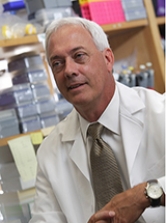
Glen N. Gaulton, PhD
Professor of Pathology and Laboratory Medicine
University of Pennsylvania Perelman School of Medicine
Vice Dean and Director of Global Health
Contact InformationUniversity of Pennsylvania
Perelman School of Medicine
240 John Morgan Building
3620 Hamilton Walk
Philadelphia, PA 19104-6055
Office: (215) 898-0848
Fax: (215) 573-7945
Email: gaulton@pennmedicine.upenn.edu
Specialty Division
Cancer and Immunobiology
Research Expertise
Research Interest
Global Health, Education Program Building, Lymphocyte development and retroviral pathology
Keywords: Lymphocyte Development, Retrovirus Pathology, HIV-1, Imaging, Diagnostics
Research Techniques:
Molecular genetics, cell biology, imaging, diagnostics, virology, immunology
Research Summary
The interests of the Gaulton laboratory focus on an increased understanding of the molecular processes that regulate the infection and pathology of retroviruses, such as HIV, the impact of these infections on the immune system, and the detection of these infections using novel imaging and diagnostic approaches.
More specifically, the laboratory has investigated the effects of human and, as experimental models, murine retroviruses during active infection of adult, pediatric and neonatal subjects. Recent results have identified the primary mechanisms whereby retroviruses induce cell destruction through cell-cell fusion, also know as syncytia formation. The laboratory has pioneered the use of magnetic resonance imaging (MRI) techniques to detect HIV infection within cells and is now applying these techniques to in vivo, whole body imaging of active infections. Lastly, using state-of-the-art engineering technology, the laboratory is developing highly sensitive yet mobile, hand-held devices to detect HIV infection in blood. These devices are critical for diagnosing new infections, and to monitor HIV levels in patients undergoing active therapy and/or participating in vaccine trials.
Other functions of Dr. Gaulton relate to the planning and oversight of Penn Medicine's world-wide global health programs.
Lab personnel:
Tomasz Rosmyslowicz,M.D., Sr. Research Investigator
Graduate Groups
Cell and Molecular Biology
Immunology
Education
B.S. (Biology, with honors), University of California, Santa Barbara, 1974
Ph.D. (Biochemistry/Molecular Biology), University of California, Santa Barbara, 1981
Specialty Certification
Postgraduate Training
Research Fellow in Immunology, Harvard School of Public Health, Department of Cancer Biology, Boston, MA, 1980-1983
Research Fellow in Immunology, Harvard Medical School, Department of Pathology, Boston, MA, 1983-1983
Awards and Honors
University of California, E. C. Anthony Fellowship, 1977
University of California Regents Fellowship, 1979
NIH Postdoctoral Training Fellowship, 1981
NRSA Viral Oncology Fellowship, 1983
National Multiple Sclerosis Society, Harry Weaver Neuroscience Scholar, 1985
University of Pennsylvania, Dean's Award for Excellence in Basic Science Teaching, 1990
Leukemia Society of America Scholar Award, 1991
University of Pennsylvania Leonard Berwick Teaching Award, 1994
University of Pennsylvania Christian R. and Mary F. Linback Award for Distinguished Teaching, 1996
Memberships and Professional Organizations
American Association for the Advancement of Science, 1979 - present
American Association of Immunologists, 1985 - 2001
AAMC Group on Graduate Research, Education and Training, 1997 - 2006
AAMC Group on Research Advancement and Development, 1998 - 2015
Association of Academic Health Centers, 2003 - 2015
Clinical Research Forum, 2003 - 2015
International AIDS Society, 2008 - present
Consortium of Universities for Global Health, 2015 - present
Web Links
Cell and Molecular Biology graduate group faculty webpage.
Selected Publications
Modification of a viral envelope glycoprotein cell-cell fusion assay by utilizing plasmid encoded bacteriophage RNA polymerase.
Lin, G, Murphy, SL, Gaulton, GN, and Hoxie, JA, Journal of Virology Methods 128(1-2): 135-142, 2005, PMID:15941597
The intrathymic pathogenesis of myasthenia gravis.
Levinson, Al, Song, D, Gaulton, GN, and Zheng, Clinical Development Immunology 11(): 215-220, 2005
Disparate regions of envelope protein regulate syncytium formation versus spongiform encephalopathy in neurological disease induced by murine leukemia virus TR.
Murphy, SL, Honczarenko, MJ, Dugger, NV, Hoffman, PM, Gaulton, GN, Journal of Virology 78(): 8392 - 8399, 2004, PMID:15254211
Neuropathogenic murine leukemia virus TR1.3 induces selective syncytia formation of primary BALB/c brain capillary endothelium
Chung Landers, M., Dugger, N., Quadros, M., Hoffman, P. M., and Gaulton, G.N., Virology 321(): 57-64, 2004


